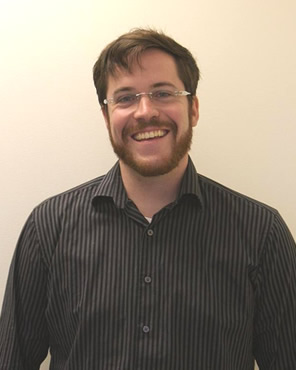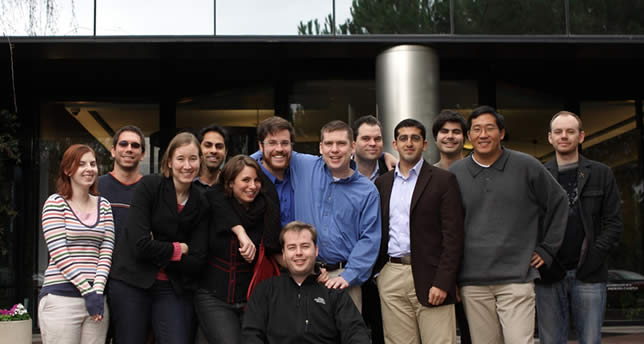
The nerd level of David Weekly from PBwiki is rather high since he proudly informed me during the interview that he started programming at the age of five. I’ve been watching David from a distance for a couple of years. He hasn’t made his fortune yet, but he will. He’s from the same mold as the Google founders and is always involved in interesting projects in Silicon Valley. His current site is PBWiki, which is a managed wiki service. The MeetInnovators publishing process is run on a PBWiki. My family also used a PBWiki for planning our family holiday. PBWiki is even being used by some US presidential campaigns, although David won’t tell us which ones.
Full Interview Audio and Transcript
Personal Info
Hobbies and Interests: Flying Helicopters, Teaching Computer Science, Taking Trips to New Places, Scuba Certification, Hosting Parties.
Favourite Sports Teams: Manchester United.
Favourite Books:
- Snow Crash by Neal Stephenson
- Cryptonomicon by Neal Stephenson
Favourite Entrepreneurs: Shawn Parker, Mark Shuttleworth, Richard Branson, Ben Franklin.
Company Website: http://www.pbwiki.com
Fast Track Interview
Adrian Bye: Today I’m talking with David Weekly, who runs PBwiki, which is short for PeanutButterWiki. David, why don’t you tell us a little bit about yourself and your background?
David Weekly: I’m very much a nerd by birth as much as by training. I started programming at the age of five. We had an Apple PC lying around the house. I didn’t really know what I was doing, but I copied programming columns that were in the back of kid’s magazines I was getting at the time. I actually did some programming work in high school for MIT Lincoln Labs and Harvard Physics Labs. I grew up in Boston and went to Stanford where I received my undergraduate degree in Computer Science in 2000.
At that point, I had been involved in a lot of start-ups, especially around digital audio. I did the last thing anyone expected me to do. I went to work for a large corporate enterprise back-up company called Legato. It was definitely an important part of my education that I don’t regret at all.
After being there for a year, I went to work for There.com. The company does online virtual worlds where you hang out with other people. I did coding that included optimizing and managing computer clusters and making forums much faster. I also did the 3-D audio jukebox, which was the first 3-D Shoutcast implementation ever done.
What was crazy about that company was how secretive they kept everything. I had to pass five rounds of interviews before they would even tell me what the company did. They were in stealth beta for a long time before they launched. I think keeping secret for five-and-a-half years before they went into public beta was a bad idea.
 My current philosophy on how businesses succeed is distinctly opposite. In order to make the right thing, you need to put the simplest possible product in front of people and hear what they say about it versus trying to make a perfect and wonderful big product in secret. It’s important that you get started on that process of getting better as soon as possible. You should take the simplest possible incarnation of your idea and just put it out there.
My current philosophy on how businesses succeed is distinctly opposite. In order to make the right thing, you need to put the simplest possible product in front of people and hear what they say about it versus trying to make a perfect and wonderful big product in secret. It’s important that you get started on that process of getting better as soon as possible. You should take the simplest possible incarnation of your idea and just put it out there.
A lot of innovators have this complex overarching, interesting, and comprehensive vision for what their product is going to become one day. They want to build the whole thing before they show it off to people because otherwise its full impact won’t be understood by the audience. As a result, they end up handicapping themselves by spending years working on something before putting it out there, and then it turns out that what they put out was the wrong thing. Sometimes they need to just launch something simple.
For example, take a look at PayPal’s founding. They were doing Palm Pilot to Palm Pilot encrypted money transfers. Flickr was meant to just be the photo upload portion of an online adventure game. It wasn’t actually meant to be a photo-sharing service. You can take a look at Slide.com‘s origins. This was a Windows application created to sit on your desktop where you could passively browse catalogues for shopping. Now they’re the number one Facebook application provider. Craigslist was just this guy’s mailing list. It wasn’t even any technology at all.
It’s fascinating how these things that start almost as an accident or a side project become successful. The market will tell you what it needs. That’s why it’s so important to get out there as quickly as possible.
The amount of resources you need to be able to take advantage of opportunities like this has gotten increasingly small. If an entrepreneur comes to me looking for advice on how they can secure a VC round but doesn’t have something implemented, I will tell them to sit down for a reality check. If they can’t come to a VC round with an already launched product with real customers, they’re going to get laughed out of the room.
Adrian Bye: I’ve been talking with people about the VC model. The general consensus seems to be that it is going away for Internet-related businesses. What do you think?
 David Weekly: What was traditionally thought of as Series A investment has become sort of friends and family. What was traditionally thought of as Series B investment, or more expansion capital, is becoming Series A investment. The price points are the same, but the stages are different.
David Weekly: What was traditionally thought of as Series A investment has become sort of friends and family. What was traditionally thought of as Series B investment, or more expansion capital, is becoming Series A investment. The price points are the same, but the stages are different.
In 1998 and 1999 you could go to a VC looking for Series A round to raise $5 million based on an idea and a team. You didn’t even need a functional prototype. By the time you got to your Series B, it was expected that you would have actually launched your product and made some revenue. You didn’t need to be cash-flow positive when you were looking to raise $10 million to $20 million. These days if you’re doing your Series A and raising anywhere between $2 million and $10 million, you’re expected to already have a product with customers and a small amount of revenue.
VC financing makes a lot of little things easier, such as hiring employees and completing partnership deals, because people know you have the backing of a real institution versus possibly not being solvent if you’re solely using your own finances. It lets you scale up, build a sales and marketing team, hire employees, and complete partnership deals.
When I started PBwiki, I would’ve been delighted to know the possibility existed to become a $5 million or $10 million company. Our VCs have been really helpful in opening my eyes to realize that this could become a billion dollar company. They are even working with me to establish a road map to become that big.
Adrian Bye: What did you do after There.com?
David Weekly: After being at There.com for a year and a half, I decided to start my own company. I looked at going to business school. I even talked to some people in business school. They said, “If you are trying to understand how to run a business, the best possible thing to do is to start your own business.” I read a couple of business books and just fired off to start my own business.
I was thinking at the time that I was going to build a Web-based project management application. After I left There.com, I spent the first two months talking with project managers about their needs. Pretty quickly, I came to the conclusion that this was going to be too hard because the project managers had wildly varying product requirements.
A part of the project management prototype I was putting together involved taking central logs of instant messages so people could instant message about project requirements. Then those notes would be automatically attached to the project definition. I called it IM Smarter and worked on it for a year and a half. It had some pretty cutting-edge technology, but it didn’t completely take off because it was not particularly well-marketed. I spent too much time working on the engineering and making it fancy and scalable but not enough time on making it useful.
I started working on some different side projects. One of them, which I wrote in a weekend, was PBwiki. I launched it in hopes that a dozen organizations would sign up by the end of the year. Two days later, we had a thousand organizations signed up to use it. I switched to that project full-time.
Adrian Bye: Plenty of wikis are out there. Why did they all start using PBwiki rather than using Twiki or some of the others?
David Weekly: In June 2005, a lot of different pieces of wiki software existed that you could install on your server. However, pretty much all of them started with “Step One: You have your Linux server…” Most people for whom a wiki would be useful don’t have a Linux server sitting around ready for software to be installed on it. They want something they can just click and sign up for in a couple of seconds and not worry about any of those servers. In other words, they want to be able to have their own private hosted wiki in about as much time as it takes to make a peanut butter sandwich.
Adrian Bye: How did you get those thousand users? Were you using anything to drive the traffic?
David Weekly: I mentioned the project to a couple different friends of mine who have blogs, and they wrote about it. Then some of the bigger blogs noted it. It started making the rounds very quickly. As people signed up for it and started finding it useful, they in turn told other people about it. In the last three years, we’ve been experimenting with different marketing campaigns and ways to get the word out about PBwiki. However, nothing is nearly as effective as people who love the product telling their friends.
Adrian Bye: How many users does PBwiki have now?

David Weekly: We have about four million people a month who touch the service in some way. We have about half a million people a month who make edits on PBwiki. About half a million unique communities exist on PBwiki. At this point, we have something north of two million unique pages of information hosted on our service.
Adrian Bye: How do you make money?
David Weekly: We’re basically a Web equivalent of shareware. If you’re using this service for your own personal uses, that’s fine. If you’re using this in a company and have more than three people using the service, we charge eight dollars per user per month. In other words, your first three seats are free. We have about 30,000 different businesses that use PBwiki.
We’re getting around now to a process where we can take a look at some of the smaller clients using the service and say to them, “Let’s talk about getting you upgraded.”
Adrian Bye: What if I don’t want to upgrade?
David Weekly: We do offer pretty steep first year discounts. We can also have a chat about your use of the wiki, how we can make you a success, and what kind of price point makes sense for you. We’re willing to be flexible to make sure we can give you a solution that makes sense for the kind of budget you have in mind.
We did experiment for about a year with running ad sense advertisements on public wikis. Even though we were generating millions of ad deliveries a month, it was pretty clear that to get to a business model where we’d be making tens of millions of dollars a year we’d need unreasonable amounts of traffic. However, it was not something that was going to scale. What was clearly scaling at the same time was that people were actually willing to upgrade to subscription payments.
Almost a year ago, we dropped all ads from our service just to make it perfectly clear to the world, “Look this is our business model. We’re selling a tool to people. We’re not trying to interrupt you.” The ad model really did not make any sense for a business productivity tool. If you’re in the middle of organizing your team, you don’t want to hear about an ad for Huggies. You don’t want to be presented with ads for different things. You’re in the middle of getting your work done, and an ad is going be a distraction.
Adrian Bye: I remember seeing an e-mail once about a session on using PBwiki for project management. Are you going to turn that into some sort of paid training model?
David Weekly: Our long-term success is going to come from being able to provide a platform that meets people’s needs. If we can help PBwiki succeed at an organization by giving away training for free, even if it costs us some fair amount of money, we get ROI on that in a real hurry. Premium training may be something we’ll be able to explore in the future.
Adrian Bye: What are some interesting uses of PBwiki?
David Weekly: We have such a wild diversity of users. We have anarchists, and we have people who run churches based on PBwiki. We have people who are putting together erotic fiction novels. We have the United Nations coordinating business responsibility plans. We have large chemical companies putting together product safety manuals for internal consumption. We have advertising agencies using PBwiki to give their clients the latest up-to-date information about their advertising campaigns. The FDA uses PBwiki in private projects to coordinate the development of new medical devices. Although we’re not authorized to disclose which ones, we have three presidential campaigns being run on PBwiki internally. One of the really interesting users of PBwiki is BarCamp, which is a series of self-organized conferences that happen all around the world on a continuous basis.
Adrian Bye: What are you doing going forward?
David Weekly: We’ve had a couple different market surprises where the people who have shown up to use the service have not been the kind of people we’re necessarily expecting. The biggest instance is how popular PBwiki has been within education and library sciences. In retrospect, it’s obvious that teachers are looking for a modern tool they can use to connect with their students outside the classroom that doesn’t require using the computer lab. Over 100,000 educators use PBwiki to provide distance learning, organize their course curriculum, etc.
Wikis have taken off like wildfire within the library communities where their job is collecting, organizing, and disseminating information. That’s precisely what a wiki lets you do in an easy and lightweight fashion.
When I started PBwiki, I didn’t think this would be a helpful tool for educators or librarians. However, they’re the people who showed up to the party, so we have to learn to service them, speak their language, give them case studies, and make sure the product helps them become successful.
Recently we’ve also had a lot of companies coming to us to use our private hosted wikis. That’;s been the main source of our revenue growth over the past couple months in particular, so we’re definitely becoming an enterprise SaaS company.









